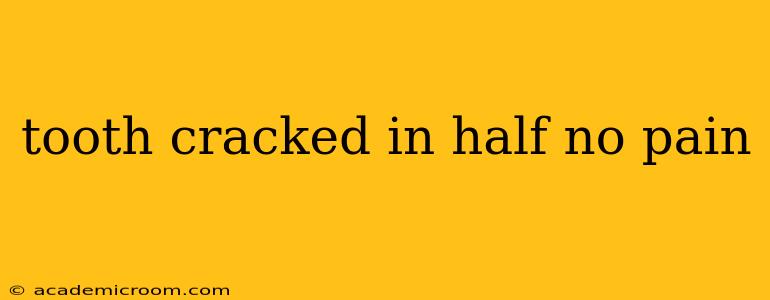A cracked tooth, even if it's not causing pain, is a serious dental emergency. Ignoring it can lead to significant complications down the line, including infection, abscesses, and even tooth loss. This comprehensive guide will help you understand what to do if you've cracked a tooth and aren't experiencing any pain.
What Causes a Tooth to Crack in Half?
Several factors can contribute to a tooth cracking, often without immediate pain. These include:
- Bruxism (teeth grinding): This common nighttime habit puts immense pressure on teeth, leading to micro-fractures that can eventually result in a significant crack.
- Trauma: A blow to the mouth, even a seemingly minor one, can cause a hidden crack.
- Large fillings or dental work: Existing dental restorations can weaken a tooth, making it more susceptible to cracking under stress.
- Decay: Extensive tooth decay can significantly weaken the tooth structure, predisposing it to fracturing.
- Underlying dental conditions: Certain conditions like periodontal disease (gum disease) can compromise the tooth's support, increasing the risk of cracks.
Why Might There Be No Pain?
The absence of pain initially is often due to the crack not reaching the tooth's nerve (pulp). However, this doesn't mean the situation is benign. As the crack progresses, it can expose the pulp, leading to severe pain and infection.
What Should I Do If My Tooth is Cracked in Half and Doesn't Hurt?
This is not something to ignore. Seek immediate professional dental care. A dentist can properly diagnose the extent of the damage and recommend the appropriate treatment. Delaying treatment increases the risk of irreversible damage.
Can a Cracked Tooth Heal on Its Own?
No, a cracked tooth will not heal itself. The damage to the tooth structure is permanent. Only a dentist can address the issue, and treatment options depend on the severity and location of the crack.
What Are the Treatment Options for a Cracked Tooth?
Treatment options vary depending on the severity and location of the crack. Possible treatments include:
- Dental bonding: For small cracks, a dentist might use composite resin to bond the crack and restore the tooth's structure.
- Dental crown: A crown is a cap placed over the damaged tooth to protect it and restore its function and appearance. This is a common treatment for more significant cracks.
- Root canal: If the crack reaches the pulp, a root canal might be necessary to remove the infected tissue and save the tooth. A crown is usually placed afterward.
- Extraction: In cases of severe damage or infection that cannot be saved, tooth extraction might be the only option.
How Can I Prevent a Cracked Tooth?
Preventing cracked teeth involves a multifaceted approach:
- Wear a mouthguard: If you grind your teeth (bruxism), a custom-fitted mouthguard can protect your teeth from excessive wear and tear.
- Practice good oral hygiene: Regular brushing, flossing, and dental checkups are crucial for maintaining healthy teeth and gums.
- Avoid biting hard objects: Refrain from using your teeth to open packages, chew ice, or bite on hard candy.
- Eat a balanced diet: A healthy diet contributes to strong teeth and overall oral health.
What Happens if I Ignore a Cracked Tooth?
Ignoring a cracked tooth, even without pain, can lead to serious consequences:
- Increased risk of infection: Bacteria can enter the crack and infect the pulp, leading to an abscess.
- Tooth loss: Severe damage may necessitate extraction.
- Severe pain: As the crack progresses, you'll likely experience significant pain.
- Spread of infection: In severe cases, the infection can spread to adjacent teeth or even the jawbone.
Remember, a seemingly painless cracked tooth is still a dental emergency. Early intervention is crucial for preserving your tooth and avoiding more extensive and costly treatment down the road. Schedule an appointment with your dentist immediately if you suspect you have a cracked tooth.
